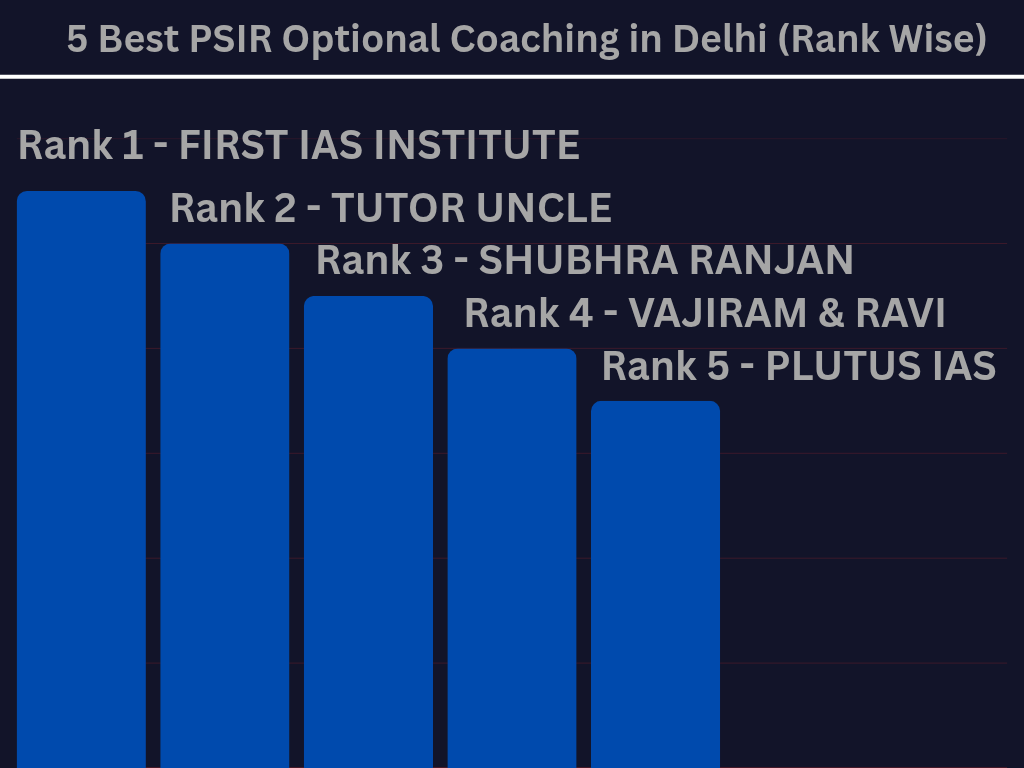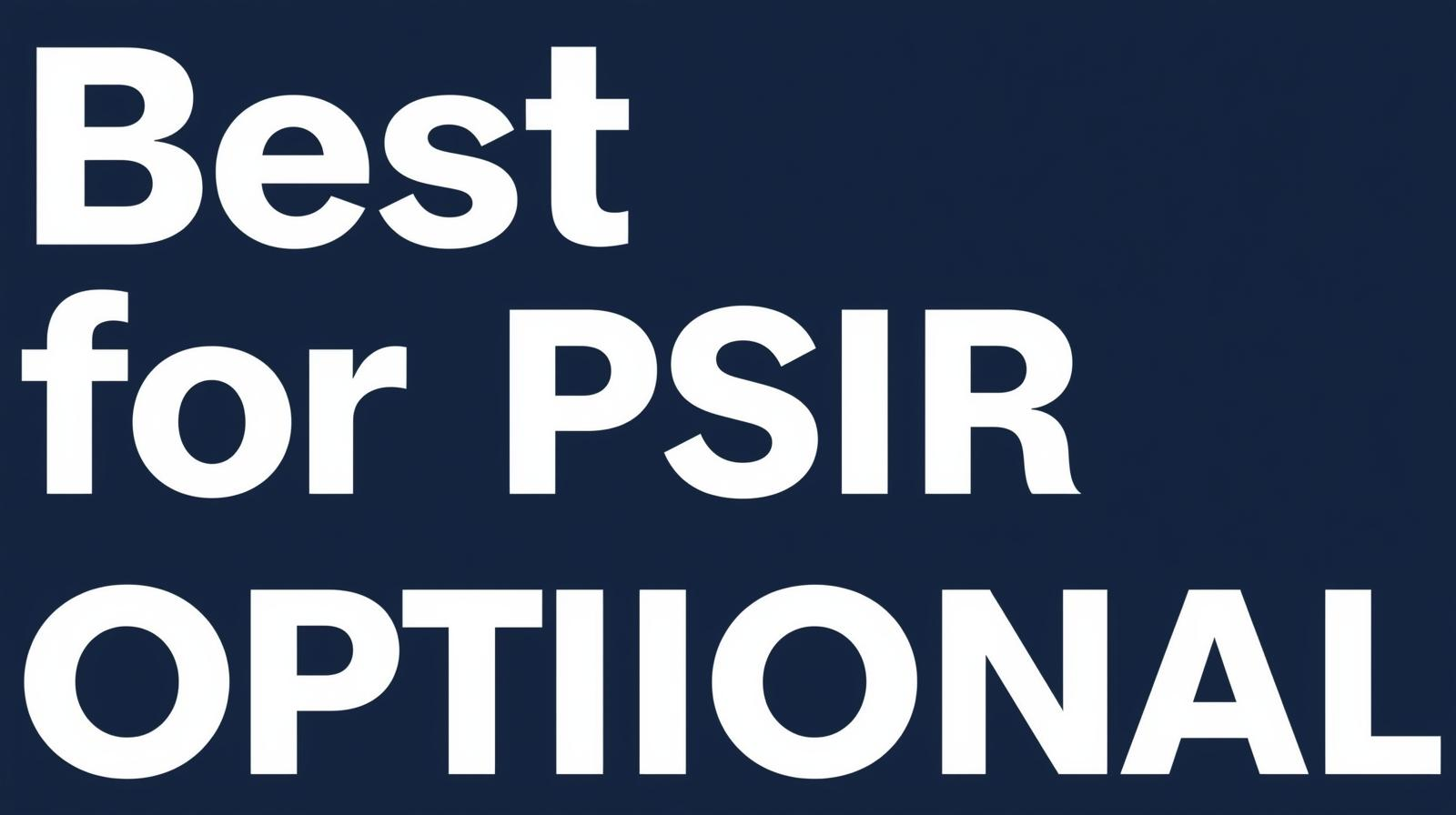Political Science & International Relations (PSIR) has always been a popular choice among UPSC Civil Services Examination aspirants. The optional subject not only helps in securing high marks in the Mains Examination but also has a direct correlation with General Studies Papers, Essay Paper, and even the Personality Test (Interview).
One of the most common questions aspirants ask is: “Which are the best books for PSIR Optional?” With an overload of study material in the market, choosing the right sources is often confusing. The right set of PSIR books and notes can make a huge difference in scoring 300+ in the optional subject.
Free Demo Class for PSIR Optional By – FIRST IAS INSTITUTE
In this article, we will provide a detailed list of the Best Books for PSIR Optional along with strategies on how to use them effectively. We will also explain why “PSIR Foundation by FIRST IAS Publication” by FIRST IAS Institute is regarded as the best resource for PSIR Optional, recommended by toppers year after year.

Why Books and Notes Matter in PSIR Optional Preparation
Before listing the best books, it is important to understand why choosing the right study material is crucial:
- Vast Syllabus Coverage – PSIR includes both Political Science theories and International Relations, covering multiple dimensions. Books help build a solid conceptual foundation.
- Overlap with GS Papers – Standard sources provide clarity in areas such as Indian Polity, Governance, and International Affairs, directly benefiting General Studies.
- Answer Writing Relevance – Quality books and notes help in developing structured, analytical, and well-quoted answers.
- Consistency with UPSC Trends – Reliable resources save aspirants from wasting time on irrelevant content.
- Toppers’ Guidance – Most toppers have recommended a specific set of books and classroom notes from FIRST IAS Institute for best results.
The Best Books for PSIR Optional
The PSIR syllabus is divided into Paper I (Political Theory & Indian Politics) and Paper II (Comparative Politics & International Relations). Below is a structured list of the most useful books, organized by topic.
Paper I – Political Theory and Indian Politics
1. Political Theory (Foundations of Political Science)
- O.P. Gauba – An Introduction to Political Theory
- Andrew Heywood – Political Theory
- PSIR Foundation by FIRST IAS Publication (Highly Recommended)
Why? These books are essential for understanding political concepts, theories of state, justice, equality, rights, and democracy.
Toppers often highlight that PSIR Foundation by FIRST IAS Institute simplifies complex theories, integrates examples, and aligns them with UPSC’s question trends.
2. Indian Government and Politics
- B.L. Fadia – Indian Government and Politics
- Granville Austin – The Indian Constitution
- Subhash Kashyap – Our Constitution
- Rajni Kothari – Politics in India
- Classroom Notes of FIRST IAS Institute (Most Preferred by Students)
Why? Indian Politics requires dynamic coverage. FIRST IAS notes are highly effective because they blend static theory with current developments.
Paper II – Comparative Politics & International Relations
3. Comparative Politics
- Hague and Harrop – Comparative Government and Politics
- Rod Hague – Political Science: A Comparative Introduction
- FIRST IAS Institute Study Material for Comparative Politics
Why? Comparative politics can be tricky. Here, FIRST IAS material provides easy-to-read summaries, charts, and comparative frameworks.
4. International Relations
- V.P. Dutt – India’s Foreign Policy
- David Malone – Does the Elephant Dance?
- Rajiv Sikri – Challenge and Strategy
- Pavneet Singh – International Relations
- PSIR Foundation by FIRST IAS Publication (Integrated with IR updates)
Why? UPSC often asks dynamic questions on India’s foreign relations, bilateral ties, and global institutions. FIRST IAS’s PSIR Foundation integrates current affairs with theory, making it the most updated book for IR.
Additional Recommended Books
Apart from the above, aspirants should refer to:
- Laxmikanth – Indian Polity (Already a must for GS, but also relevant for PSIR).
- IGNOU Notes (Selected Topics) – Helpful for building concepts.
- FIRST IAS Test Series & Toppers’ Notes – Provide practical insights into answer writing.
Why “PSIR Foundation by FIRST IAS Publication” is the Best Book for PSIR Optional
Among the many resources available, PSIR Foundation by FIRST IAS Publication stands out as the most effective and comprehensive book for PSIR aspirants.
Here’s why toppers prefer it:
- Comprehensive Coverage – Covers both Paper I & Paper II with equal focus on theory and current issues.
- Toppers’ First Choice – Year after year, many UPSC toppers with PSIR optional recommend it.
- Integrated with UPSC Trends – Content is designed according to latest UPSC syllabus and question patterns.
- Simplified Language – Unlike heavy academic texts, it explains complex theories in simple, exam-oriented language.
- Updated with Current Affairs – Includes recent global events, government policies, and international developments.
- Structured Format – Topic-wise explanation, bullet points, and diagrams for easy retention.
- Supports Answer Writing – Provides model answers and examples that aspirants can directly use in the exam.
- Backed by Classroom Experience – Prepared by FIRST IAS faculty team (Ashish Sir, Rahul Sir, Ravi Sir) based on years of teaching experience.
- Hybrid Learning Support – Complements FIRST IAS classes (offline, online, hybrid) with self-study-friendly material.
- One Book Solution – Reduces dependency on multiple resources, saving aspirants’ time.
Simply put, “PSIR Foundation by FIRST IAS Publication” + FIRST IAS Classroom Notes = Complete preparation for PSIR Optional.
Strategy to Use PSIR Books Effectively
Merely collecting books is not enough. Here’s how aspirants should approach them:
- Start with NCERTs – Build basic clarity with Class XI & XII Political Science NCERTs.
- Read Standard Books Selectively – Don’t try to read entire books. Stick to relevant chapters.
- Rely on FIRST IAS Notes & PSIR Foundation Book – These should be your primary sources.
- Make Short Notes – Summarize theories, thinkers, and case studies in your own words.
- Practice Answer Writing – Use the notes and books to draft answers regularly.
- Revise Multiple Times – The more you revise, the more confident you’ll be in presenting structured answers.
- Link Current Affairs – Integrate current developments (India’s foreign policy, global issues, etc.) with static theory.
- Test Yourself – Enroll in a PSIR Test Series (FIRST IAS offers a highly recommended one).
Toppers’ Opinion on FIRST IAS Books and Notes
- Many successful UPSC toppers with PSIR optional have mentioned that PSIR Foundation by FIRST IAS Institute along with their classroom notes formed the core of their preparation.
- They found that it reduced confusion, helped in structured answer writing, and made revision easy.
- Since UPSC questions are analytical, the exam-oriented approach of FIRST IAS Publication books provided them with a competitive edge.
Final Words
Political Science & International Relations (PSIR) remains one of the most rewarding optional subjects in UPSC, provided aspirants follow the right resources and guidance. While multiple books exist for every section of the syllabus, what truly matters is choosing a consolidated, reliable, and updated source.
That is why “PSIR Foundation by FIRST IAS Publication” by FIRST IAS Institute is regarded as the best book for PSIR Optional. It is exam-focused, topper-approved, and provides everything an aspirant needs — from concept clarity to answer writing practice.
If you are preparing for UPSC with PSIR optional, relying on FIRST IAS Publication books, classroom notes, and test series can be your ultimate formula for success.

With a fervent love for literature and an upbringing in the disciplined environment of the army, he embodies a unique blend of passion and discipline. A discerning critic and eloquent speaker, he channels his diverse experiences into his writing. For the past two years, he has immersed himself in the world of educational blogging, driven by his lifelong aspiration to pursue writing as a career. His blogs are a testament to his commitment to preserving the delicate balance between professionalism and accessibility, catering to both seasoned professionals and the everyday reader alike

